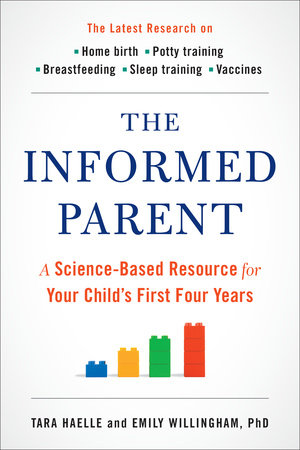An Expert’s Opinion: What Parents Can Do That Apps Can’t
by Tara Haelle & Emily Willingham
The following is an excerpt from The Informed Parent: A Science-Based Resource for Your Child’s First Four Years by Tara Haelle and Emily Willingham, Ph.D.
The past decade or so has seen an explosion of DVDs, flashcards, tablet and smartphone apps, and overall “systems” to teach your baby to read. They seem to be selling the idea that reading is a straightforward linear process of recognizing letters, attaching sounds, building them into words, and — voilà! — comprehension.
Alas, it doesn’t work that way.
Reading is one of the most complex cognitive tasks we ask our brains to do, and it brings together a wide range of interacting skills that takes years to develop. A handful of studies have directly assessed some of the programs that claim to teach babies to read. One of the best designed ones randomly split up 117 babies, ages nine to 18 months, and assigned the intervention group to use a program involving DVDs, word and picture flashcards, and word books for seven months. Then they comprehensively assessed both early literacy skills, such as knowing letter names and sounds and decoding words, and conventional reading, including vocabulary and reading comprehension, in both groups. Even though the parents of the babies using the reading program perceived benefits and had confidence in the program, their infants showed no greater abilities in any literacy, speech, or related areas after seven months of the program than babies who had no exposure to the program. All other studies on similar systems, though not typically as rigorous, have found similar results.
In short, no, your baby can’t read, and these programs won’t change that.
What does help children eventually become successful readers is surrounding them with an environment as rich as possible in words and books. One long-term study, for example, found that 60% of the differences in vocabulary among eight- and nine-year-old children was explained by how much language they were exposed to at home before they were three years old.
These activities specifically support literacy:
Lots of talking. Starting in infancy, the more words children hear, the stronger their verbal development, but this talking needs to come from real people — not the radio or TV — and the more the speech is directed at the child, the stronger their language development becomes. One study found children who experienced more “child-directed speech” had bigger vocabularies by age two than those who overheard speech but were directly addressed less often.
Books, books, everywhere! Numerous studies have found that children’s reading ability correlates with how many literacy resources they have at home. When kids are young, just handling books (even if that means chewing them) is considered an “early literacy behavior,” as is talking about pictures or imitating what’s seen in a book. A meta-analysis of 99 studies of reading from preschool through high school found “print exposure” explained 12% of the differences in preschoolers’ and kindergartners’ oral language skills.
Storybook reading. Reading aloud to your child starting from the early months is one of the single most influential things you can do. As children get older, discussion through open-ended questions, such as what your child thinks will happen next, why something happened, how a character feels, or even what’s already happened, offers additional benefits. An analysis of 11 studies found that having children retell or act out a story they’ve read supports reading comprehension, expressive vocabulary, receptive language (understanding what they hear), and overall early literacy development. And don’t despair if your child wants to read the same book all the time: repetition builds familiarity and may encourage kids to try reading that book on their own later.
Adapted from The Informed Parent: A Science-Based Resource for Your Child’s First Four Years by Tara Haelle and Emily Willingham, Ph.D. © 2016 by Emily Jane Willingham and Tara Haelle. TarcherPerigee, an imprint of Penguin Random House LLC.
-
The Informed Parent: A Science-Based Resource for Your Child’s First Four Years
Available from:Also available from:

